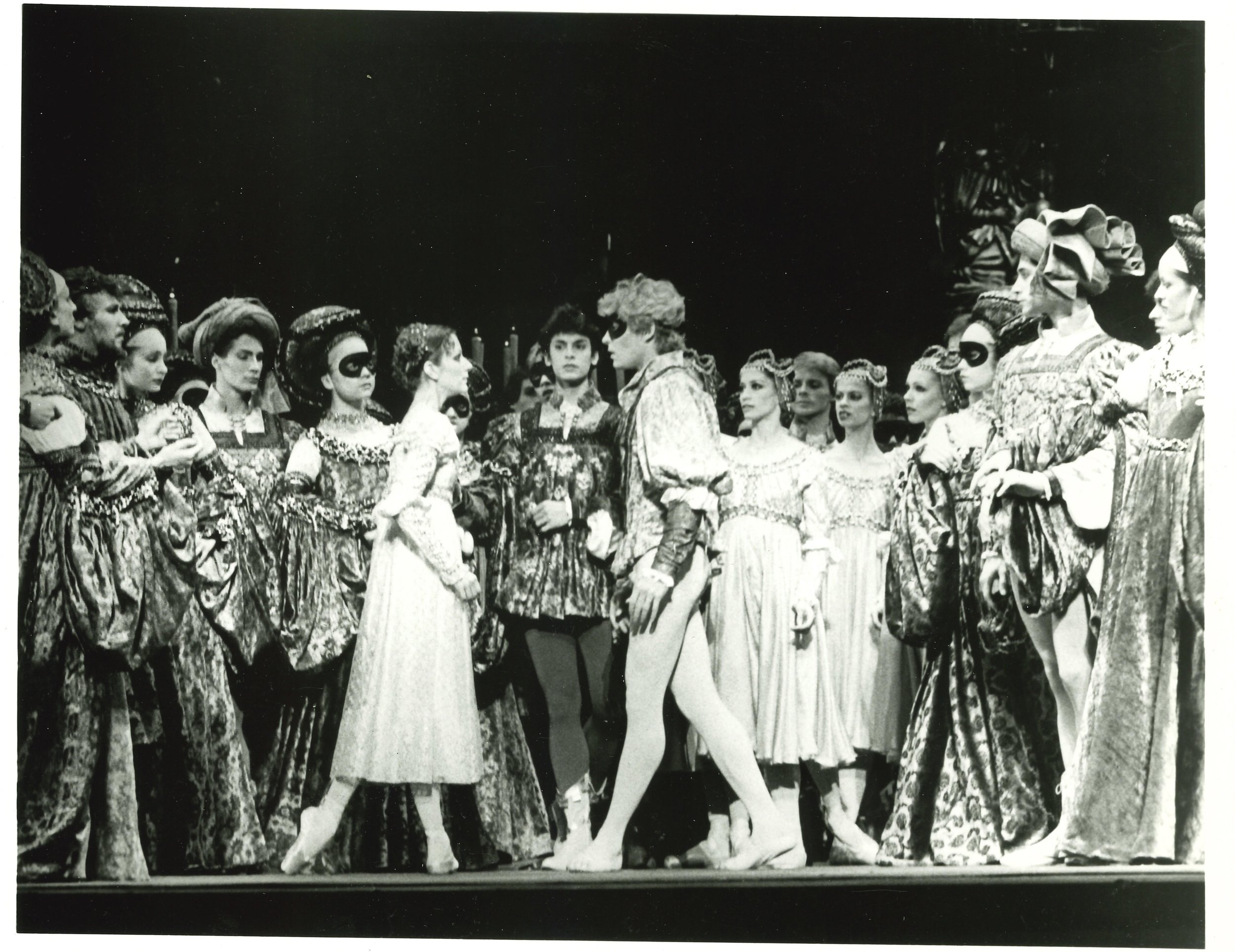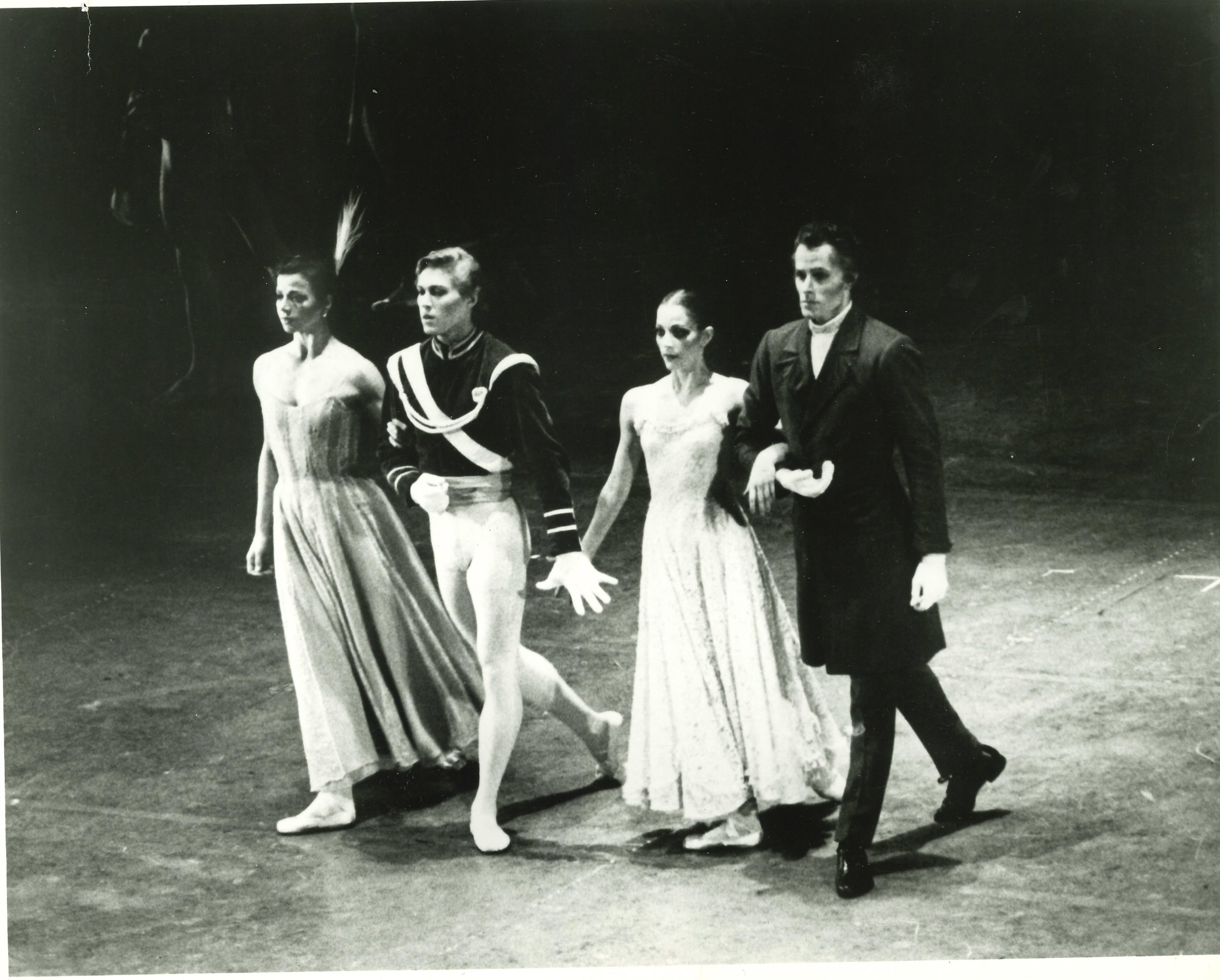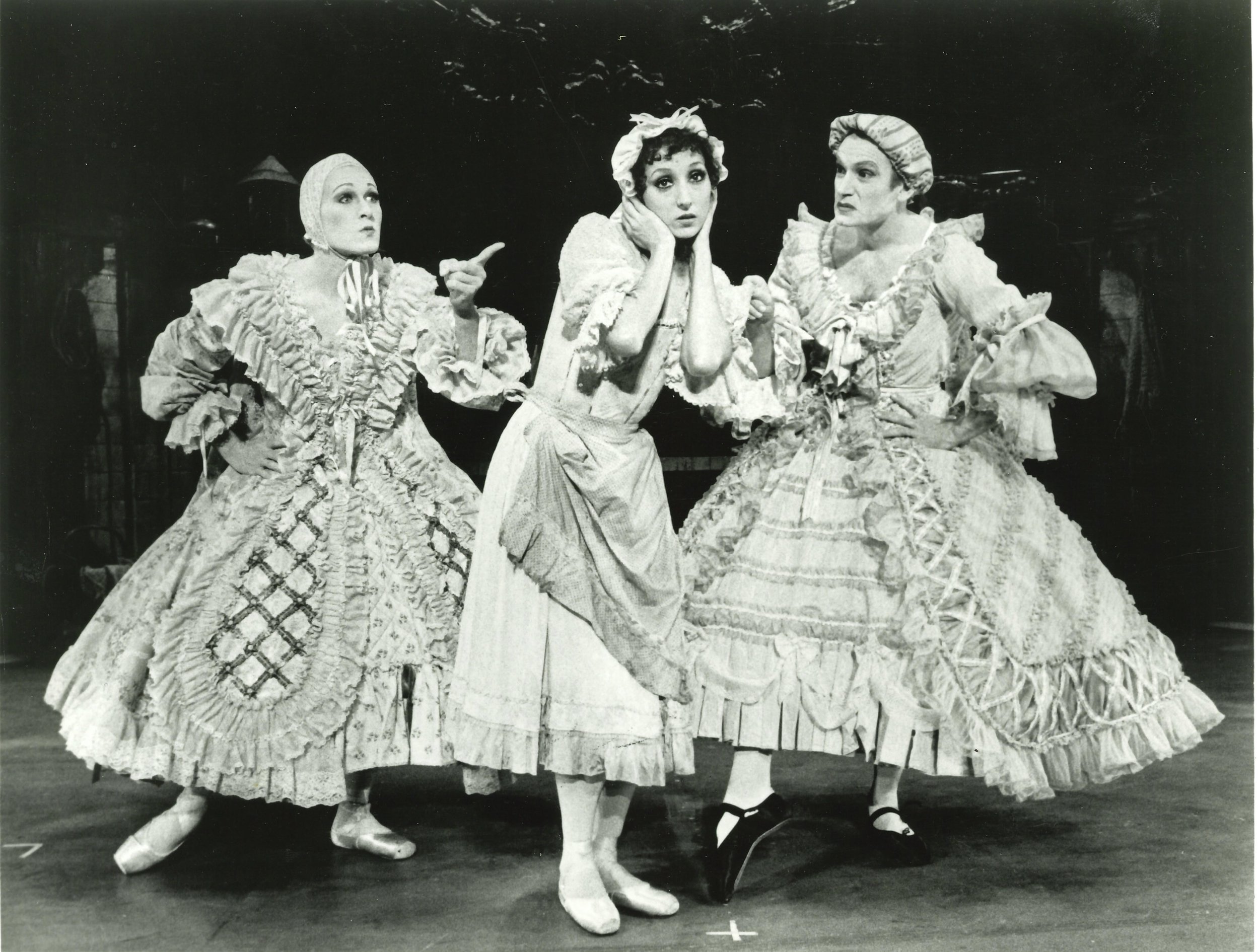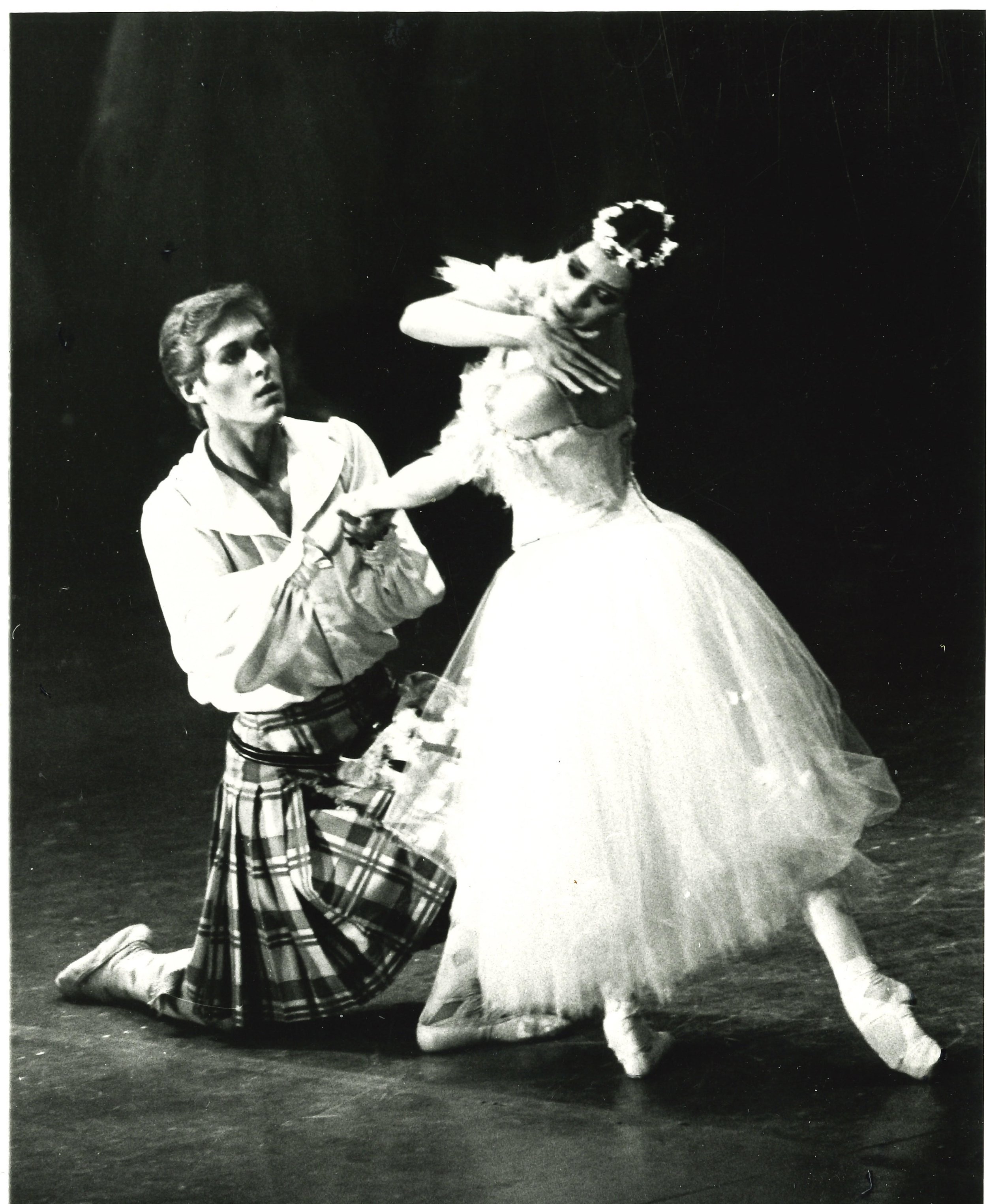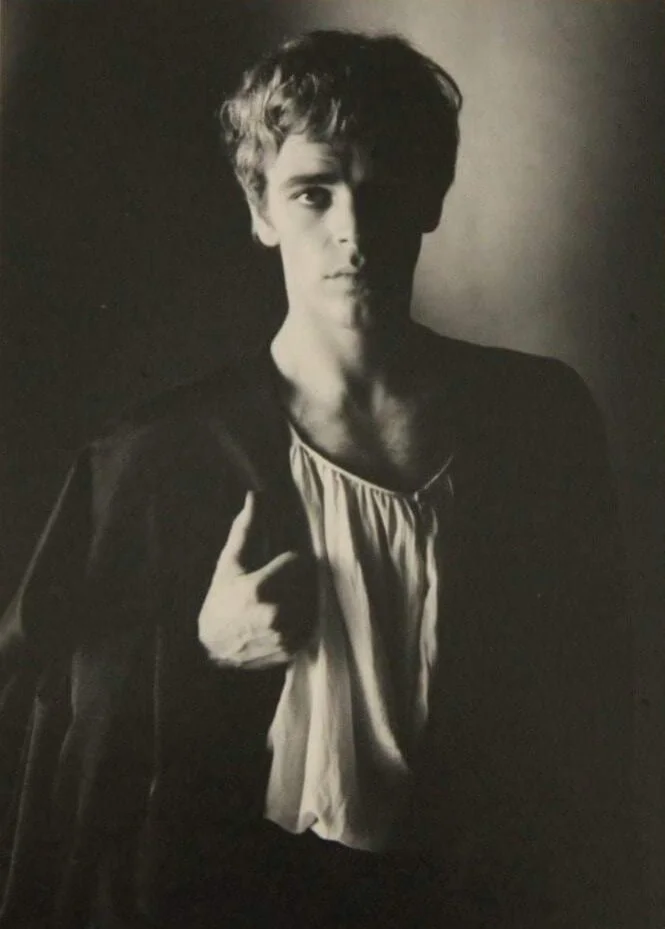Robert La Fosse - Danseur : An Interview (Part 1)
About the Past, the Artist, HIV, Death, being Gay, Representation.
I don't remember who wrote that but many years ago someone commented that during the 70s EVERYBODY in New York City, either male or female, was „in love" with Peter Martins from The New York City Ballet. To be completely honest with you, the comment was not as „classy" as that and in fact, used quite vulgar parlance while referring to what everybody was supposed to want to do with Peter Martins! But that is not the „pointe" and I do not really remember that „state of mind"; I remember though a time when EVERYBODY was in love with Robert La Fosse. Yes.
Once I wrote a review about Mr La Fosse's book (in cooperation with Andrew Wentink): a beautifully conceived book; extremely precise in its proposition and a very well constructed testimony of a part of his career („Nothing to Hide", DIF – Donald I. Fine Inc.). As a surprise to him, I „tagged" him in a copy of my review (I am referring to Facebook). He thanked me in the most polite way possible but added that he had just deleted it from his page „Because it seemed somehow like I was doing some self-advertisement". Now, honestly, how could I not agree with somebody so honest, so humble? My admiration, which went back to the days when I shared the same Studio with him for some classes (Yes, back in those days when whole New York was beginning its „love-affair" with him), grew even more!
Some years have passed, our contact grew to be more and more. Just the way a strong foundation is built. Slowly, to last. Then the idea of this interview. At last. And here we are. The right time had come.
But preparing for this „talk" required also some research from my side – and I was reading, watching old videos, pictures... comparing, not finding what I was searching for, making notes on his repertoire during the ABT and The New York City Ballet years, not getting the answers to the questions I had neither asked nor found yet. Something, „it" was missing... but what was „it"? How could I be wanting to find something I did not know how to describe, something I did not know yet?
At the barre… Copyright: Arthur Elgort
But then, by pure „casualty" („the relationship between cause and effect", coincidences do not exist) the most surprising thing happened. And also quite simply, making me aware of the fact that when the time comes you will find automatically what you have been looking for even if you could not describe, articulate or express it...
One evening, it was quite late, I was sitting comfortably in my living room watching ABT's glorious production of Baryshnikov's „Don Quixote" with the equally glorious Cynthia Harvey, in which Robert has the relatively small role of one of Basil's Friends. At the near End of the Ballet, while watching the „intermittent" (a very fashionable word right now, which helps me immensely to describe so precisely this part of the Ballet) Coda, I became aware of his presence; staying on stage, watching the main couple, being a part of it all. Actively being a part of the whole.
And then „a bell rang" and I could, at last, see what I had been looking for, without having been able to express it. This quality, which is so „la Fosse's" as a man of the 21st Century, was already there, to be seen on the Dancer from the 20th Century. This unbelievable presentness, this alertness to all that is happening on stage, this involvement with the world around him, this same quality that comes out every time he expresses an opinion. This enormous sense of participation was already there, inside the young dancer to be seen, to be nearly touched. I went to bed very happy that night – I knew I had found the way to tell my story on Robbie.
Romeo and Juliet with Leslie Browne. Copyright: Martha Swope
This may seem an unusual kind of interview but it is not. Mr La Fosse needs no introduction to the Ballet World – he has not only danced brilliantly but also partnered many of the great dancers of our generation. Dancers like Cynthia Harvey, Martine van Hammel, Leslie Browne, Mikhail Baryshnikov, Peter Fonseca, Elaine Kudo, Susan Jaffe, Natalia Makarova, Gelsey Kirkland, Marianna Tcherkassky, Victor Barbee, Cynthia Gregory, Suzanne Farrell, Patricia MacBride (How I love her!), to name just a few. You can have a much better overview of his career reading „Nothing to Hide", the book that describes his personal „Yellow Brick Road" from Texas to New York, in an analytical way, chronologically accurate. It would have been repetitious and particularly boring if I would have entered the field of his personality with a long oration of his story and history. It has been done. And in my opinion brilliantly done with Andrew Mark Wentink's careful, detailed (and incomparable) Know-How in the book mentioned above.
I also don't want to say that I wanted to go “further”. I am handling the same subject, just from another perspective. This Interview goes beyond the Dancer to reveal the Man. The coherent, somehow rigorous, responsible, lucid, very consistent, extremely generous Man who, with incredible LOVE to his vocation, profession and with high RESPECT to his skills, his instrument and all around him formed and moulded the Artist he is. Also very instinctively.
We share this love for the Arts and yes, you have read it right; to mould... And writing about that and thinking of it, a single line of an old Gershwin tune comes immediately to my mind.
„In time the Rockies may crumble
Gibraltar may tumble
They're only made of clay
But our love is here to stay"
Well, it IS all about Love too, am I right?
After telling Robbie more or less which „track we were going to follow", we simply and uncomplicatedly started chatting...
Jardin aux Lilas (Anthony Tudor) with Martine van Hamel, Leslie Browne and Erich Weichardt. Copyright: Martha Swope
„Let me start talking about my book, which has my life up to when I was 27 or 28 - I didn't know exactly why I was writing it. I had been diagnosed with HIV a few years earlier; maybe I thought I was going to die... I had been approached to write it and perhaps people thought there was going to be some dirt on people from the Company - Gelsey's (editorial note: Gelsey Kirkland) „Dancing on my grave" had just come out, remember? But the book turned in to be more of a coming-out story. Of course, it was about my life as a dancer and growing up but it was also the story of a boy who knew he was gay from a very young age. What I didn't realize was that regarding it historically, it was gonna be the first biography about a ballet dancer coming out. Up to that point Nijinsky, Nureyev had never written about their sexuality, Erik Bruhn never came out, Anthony Dowell, Richard Cragun... all the people that were gay had never written about it. Then the book came out and I had sort of forgotten about it after a year, up to the point when I started getting letters from young boys who were thanking me for writing about how accepting my parents were, the usual struggles of being gay. To me, personally... I don't find the word... I feel very..."
„Proud of it?" I add
„Yes, perhaps it is one of the most important things that I did, not even knowing what I was doing. I was just telling my life... but in doing so, it was an act of courage!"
„The book was published in 1987... Another „era" completely„ I say.
„But I didn't want to “frame it” in just that; I didn't want to sound like „Now I am going to come out to the public and be very courageous". I had been „out" for ages... with my friends, in the ballet world, in the 70s and 80s in New York "
I cannot help but think how prudery, as in a vicious circle, keep coming into and out of our lives cyclically. Think of the openness of the 1920s and 30s and the 1970s and 80s compared to the prudery of the 1940s and 50s and the one since the 1990s...
Other Dances (Jerome Robbins) with Susan Jaffe. Copyright Paul Kolnik.
„So, I go from that point because that is what people most know about me, my life up to my late 20s... I don't think I even mention my HIV status in the book and how my life was saved by being able to have been on a drug-attempt programme. I was very lucky that I got the drugs two years before their approbation! I don't think I would have made it without them. Yeah, my life was saved. But people don't know how sick I have been, how I felt looking at people, friends dying around me, right and left. That is the art of the Story that people don't know about. The devastation of what we were witnessing. A lot of dancers at the American Ballet Theatre were dying. Peter Fonseca was the first one, David Cuevas, Gregory Osborne, Clark Tippet, Charles Ward... just one right after the other. It was devastating."
La Sonnambula (Balanchine) with Gelsey Kirkland. Copyright: Martha Swope.
„A question about HIV – but if you don't want to answer it, that's OK..."
He immediately said „No, I want to talk about HIV! A lot!"
„OK, you told me that you were diagnosed with it in 1985, right? It was just before you started working with the New York City Ballet – those were times in which people were still ignorant about how one could get AIDS – remember all the fuss that was made because Rock Hudson had kissing scenes with Linda Evans in that terrible „Dynasty" series? Did you have to go to Peter Martin and say „I'm HIV +?"
„No, it's against the law, first of all for anyone to know your private issues around health. All your medical records are private unless it affects other people but at that point, we knew it was a virus you couldn't get from kissing but was I conscious of the fact that I was on stage kissing in „Slaughter on tenth Avenue" and in „Romeo and Juliet"? Yes, of course. But we knew that it was not dangerous to be onstage with other dancers and I didn't think it necessary to go to Peter Martins for that but as I told some close friends about it, I assume that basically everybody knew... Did I care? NO, I didn't care!"
La Sylphide with Cynthia Harvey. Copyright: Martha Swope,
„And you kept performing, working throughout this... even raising money for AIDS-research, for something that affected so much the ballet world... „
„Yes, we raised tons of money. This affected the Dance, the Art world in a big way. Everyone was very conscious of it and everyone had lost friends because of it. In the Ballet World, there was no shame about it. I wasn't ashamed of it, I just didn't have a T-shirt in which it was written „I'm HIV+" but it took ten years until I could get another drug for my treatment – this means, it was ten years of worry. What I did to get through this period, was something I did not realize at the time. You don't think at the moment about how you are going to get through something that horrifying. At that time I was having success in my career so I had, like a horse, to put blinders on, and not think about the emotional state of what was going on around me. I had to focus. It was a state of denial. I didn't want to allow any of that emotion to come in. It was not until much later, when I have stopped dancing that I went through the process of emotional trauma. Those days were dramatic. And funny, no it's not funny, a lot of those feelings come now again... „
Cinderella with Magali Messac and Victor Barbee. Copyright: Martha Swope
„You mean they are also somehow related to what is going on now, the pandemic?"
„Yes, I know people who have died because of Covid-19. They were not close friends of mine but I knew them and this brings up a lot of..." he pauses thinking and says in a deep breath „the past, you know. Trauma. Grief." He pauses again getting deeper into memories, emotions, reflections „Now I'm at a stage of my life where people around me are dying, you know, the ones in elder ages like my dance teacher who just passed away, so I am experiencing death when it usually happens. Death as a normal result of life. But this pandemic brings a lot of that period back in which Death was not natural. I was experiencing a great deal of success but surrounding me there was this darkness. Two things were going on... „
„Life and Death. Farewells... „
„Yes, and by losing all these people, you also lose part of your history – you lose the idea that you are going to grow up with these people and that you'll grow old together, share memories... Now all memories that I have were left with me. I have these people's stories... I have stories of Peter Fonseca, David Cuevas... even Rudolph Nureyev. I share those stories. Those people should still be with us, being able to tell their own stories, to continue their stories. So every time I think of that epidemic I think of the big void, of all that could have happened were they still here, among us."
Follow the fleet (John McCall) with Baryshnikov. Copyright: Martha Swope
„This makes me think of Stephen Fry's book „Making history"... if we could only turn back the clock... „
„A book... If I were to write another book it would start with the AIDS epidemic, go through my „story", stop dancing etc. and probably end with this pandemic – the parallels... the horrific handling of it, the way it took so long to our government to react to it. Frightening. It brought all back to me, a kind of „Oh, here we go again. We're dying and nobody is taking care of us", the horrific handling of it, especially in America, when comparing and looking at countries that were reacting much quicker... this past year has brought back many memories, the past... I turned 61 during this pandemic, I am looking forward to what „the third act" is gonna be like!"
„So am I", I had to say, interrupting him but he laughed „Of course, we all are... but that is another thing: there are so many changes happening at the moment, especially concerning Social media and Dance"
As Hilarion in Giselle with Gelsey Kirkland. Copyright: Mira
„I am glad that you have mentioned that... this is something I wanted to and had to discuss personally with you. Go on please, I did not want to interrupt you again!"
„Let me get this right, Social media... I know it's necessary but I think that the focus in dance right now has become more physical. There are great things about it: Health, the physical health of Dancers but what Social media has done to these kids... They lost a lot and they don't even realize it. They have no „contacts" to the past, they only see video after video, they see photographs, they don't have the experience to know what the mystique of someone like Makarova was like!" he pauses for one tiny second, just to make one of the funniest comments that I have heard in the last months „Back then you only saw Makarova on the stage or maybe in a few little interviews but you didn't see her in her kitchen making breakfast every morning on Instagram!" I nearly broke down laughing but he continued „It's a different world, and of course, this has to change. It is a reaction to what is happening now. We are looking at Ballet in the context of the world we live in, so a lot of changes is going to happen and I think it's going to happen very quickly. Because of all we're going through now. You know, gender issues, „black lives matter", representation. The Ballet world is behind in representation, it is basically a eurocentric, white art form"
La Sylphide with Gelsey Kirkland. Copyright: Sue Martin
„Let me ask you something, " I said „You have just mentioned two important movements („Black lives matter", „Gender issues"). Let's get to „political correctness". Sometimes it is becoming too much for me. I am not saying that I am not (or not try to be) politically correct. I am (and I try to be it). But sometimes the exaggerated way in which it is being handled is getting on my nerves!"
„The issue in America is very different from the one in Europe. The thing is you don't have that much representation as we do, we have a history with slavery, the context is very different. I don't think of it as politics, I think of it as progression. Sexuality, for example, is not taken into consideration when we are casting – gay men play straight characters all the time in Ballet – but there are issues. Real deep-seated issues. A story: when Peter Martins went to the stage „La Sylphide" in Pennsylvania, Ricky (Richard Carter) wanted to cast Deborah Austin as the sylph. She was the best Dancer to do it. She was black and Peter said „Ricky, there are no black sylphs!" and Ricky said, „Peter, when have you seen your last sylph?". Right? So, this story tells us a lot about us, as white-bodied people. We have a „history" of what we know and what we see when it has to do with skin colour, gorgeous feet minds, a character and all that we „label" – THAT, when I speak about changes, will be quite difficult to change. There are so many things we all struggle with... For example, I have seen many „Superstars" in the 70s and 80s which I thought were complete „wrong" for the roles they were playing (I am not going to tell names because it's not right) but they were principal Dancers. That says it all. The „system" of Corps de Ballet, Soloists, Principals has nothing democratic about it. This is something we grew up with, something we understand but what I have seen in the last 20 years is that this system is being broken down. Yes, there are levels, different levels of achievement but the gap between them is much closer. The difference between Soloists and Corps de Ballet is much smaller than it used to be. Therefore it should also change..."
Liv Ullmann and her book “Changing” come to my mind but I refrain from talking about it and ask „But getting back to Ability, Gender, Race... Do you think that this is a special issue in this country?"
„The systems are completely different – we don't have in America those big Conservatories, like in Russia or Paris, paid by the Government where the Dancers are „hand-picked" because of their body types. And we'll probably never have this. Because it's Government-run. Everything here is supported by private Funding. Everything. The Government supports nothing. We have to open it up to everyone; so it is more democratic here. But it has to be a better representation you can't just pick one black and one Latin Person and say that "we're doing our job". We have to reach out and change the system. Even in the Gender issue. Most companies have been run by men, straight men. So we have to change that too. This is changing slowly and women have to be given that power, to feel that they can lead something"
„But there is much more to it... „, I add.
MacMillan’s The wild Boy with Natalia Makarova. Copyright: Sue Martin
„Yes, MY problem is, as a gay man, that I don't see „my Stories" being told in Ballet. There's no „Brokeback Mountain" on stage. In the Ballet World, no gay Stories are being told"
„Except for Matthew Bourne's „Swan Lake"?"
„That's it. But that was how many years ago? That's tokenism. It was 20 years ago. That is no representation! Think of Literature. It does represent much better the world around us. What is not understandable is that we have plenty of gay Choreographers. Why aren't they telling their own Stories? Why aren't they telling „Brideshead revisited"? Why aren't they telling the Story of a Man who's confused about his own sexuality? We, in the Ballet World, are stuck in this phantasy, romantic ideal – Don't get me wrong; I love Swans and I love Willies. Think of MacMillan: he told stories of his time; they were difficult Stories. But now we have stopped progressing on what we show on stage"
Robert La Fosse by David Morgan.
„That is right. Although „here and there" there are some gay Stories told on Stage like Lifar and his lover in Eifman's „Giselle Rouge" but that is too little, I agree, and not representative at all"
"I think this generation thinks that by putting two Men dancing together on stage, it is a big movement forward. It's not. We were doing this in the 70s already. We have put two men together dancing but we haven't put two men together kissing, loving, having intimate affairs on stage and also two women"
„But would the „Sponsors", the people who finance the companies with their own money, be willing to give money to another kind of Dance Narrative so different when compared to the Ballets they are used to?" I ask ironically.
„I don't think so. The Artistic directors take this kind of decision, not the public. But, you made a good point. In America, we show Ballets which we think will sell tickets. We put on „Peter Pan", „Alice in Wonderland", titles that are known to the public. We are not educating. We are not putting on Stories based on Novels or really important Stories. And we're going backwards. But what is the point of going back to what the original Petipas was? The technique has progressed so much. We have progressed. We always should move forward... But these are questions... I am not an Artistic Director and I don't have an opinion on this. My point is, as a gay man, I would like to see my Story reflected on the Stage. That's all I am saying. And I think black Bodies would like to see their Story. It is a too white excentric World, the one we have established. And it has to change. This is not political. When Lincoln and Balanchine started the New York City Ballet they wanted it to be half white, half black. That never happened. Their ideal and their goal did not happen. I believe we need to do better, try harder and make that change."
„I did not know that part of Balanchine's and Lincoln's goal. Why do you think it has not happened?"
„I think it is financial – it is very expensive to study ballet, the point shoes alone, the lessons, the time it takes. It is economical. A lot of children who are talented and have no money need scholarships. I would never have studied Ballet unless my teacher, Marsha Woody, hadn't given me a scholarship. My parents couldn't afford for me to study ballet six times a week... „
„How lucky we are that she did that... „, I have to add.
„I", he emphasises the word „I", „was very fortunate and I believe that this is something this country has to look at, I mean the situation is completely different in Europe. I guess it's easier, when you're talented, at the age of 8 or 9 to go into one of those State-run Schools – we don't have that here... we have to look after ourselves"
„Funny, just the other day I was watching a show, I mean the ceremony in which Fred Astaire got his AFI Award, and a comment by Misha. During his marvellously intelligent speech he comments that in America you have to pay for your ballet classes – and when you're paying „Boy, you learn quick!". That's good when compared to Paris, London, Russia, Vienna, not true?"
He had to laugh out loud about that.
The little Ballet (Twyla Tharp). Copyright: Mira
“This is right – the „attitude" is a completely different one – in the States, one cannot „rely" on the comfort of having a school, teaching, academic learning, place to sleep in, food, doctors etc. - all paid for – when you're alone in New York, trying to get ahead, things can be quite different... And on top of it all: you have to want it – regardless of having or not having talent... Well, truth be told, if I'd be growing up today, I would never make it. I didn't have one of those beautiful bodies with incredible feet and arch. I didn't have what most of those kids have today. I had the desire, I had the passion, the willingness and the fire, as Cynthia Harvey would say. She always said: “You have to have the fire. I don't care how talented you are – you can be talented and not want it – like many students I've had and that decided to go to College", Do you know what I mean?”
End of Part One: The second part of this interview will be published online on January 24th, 2022.





